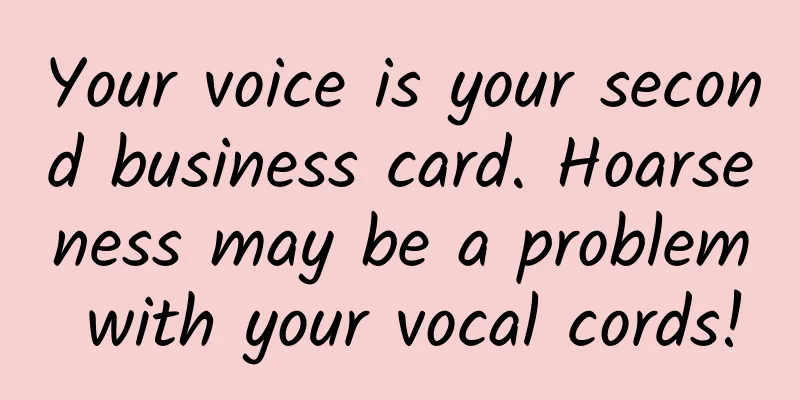Your voice is your second business card. Hoarseness may be a problem with your vocal cords!

|
Author: Yan Yan, Chief Physician, Peking University Third Hospital Member of the Laryngology Group of the Chinese Medical Association's Otorhinolaryngology-Head and Neck Surgery Branch Reviewer: Liu Yuhe, Chief Physician, Beijing Friendship Hospital, Capital Medical University Vice Chairman of the Science Popularization Branch of the Chinese Medical Association Wang Xifeng's appearance in "Dream of Red Mansions" is classic. You hear her voice before you see her. Her crisp words, "I am late and have not welcomed the distant guest," make Lin Daiyu realize that this is a bold and generous character. When Wang Xifeng first appeared, she came to life in front of the audience with her unique voice, a scene that will never be forgotten. Voice is a person’s second business card. Everyone’s voice is unique. So how is the voice produced? 1. How is the sound produced? You need to understand an organ first, that is the larynx. The vocal cords are located inside the laryngeal cavity and are a very important organ for our vocalization. Figure 1 Original copyright image, no permission to reprint The movement of the vocal cords is mainly regulated by the laryngeal muscles. The muscles that close the glottis are called the lateral cricoarytenoid muscles and the arytenoid muscles, and the muscles that open the glottis are called the posterior cricoarytenoid muscles. When you inhale, the glottis opens, and when you exhale, the glottis closes. The airflow blows the vocal cords open and close, causing them to vibrate, and then sound is produced. In life, we often find that many people have abnormal speaking voices and hoarse voices. What is the reason for hoarseness? Is there something wrong with the vocal cords? 2. What are the common causes of hoarseness? Some people's voices become hoarse after catching a cold or talking loudly. A cold, talking loudly, or acute laryngitis can cause the vocal cords to swell and become congested. When the vocal cords are not closed tightly, air will leak out and the voice will become hoarse. If the lesion is particularly mild, with swelling as the main symptom, the voice may slowly return to normal within two weeks through rest or removal of the causative factors, such as recovering from a cold, not speaking loudly or speaking less, not smoking, not drinking, and not eating irritating foods. But if you are not careful, overuse your voice, especially like to shout, and catch colds frequently, they may gradually grow into nodules or polyps. Figure 2 Original copyright image, no permission to reprint If a polyp or nodule grows on one side of the vocal cord, the voice will be hoarse and the person will subjectively try harder to speak clearly, and the vocal cord strain may become more and more severe. If a polyp or nodule grows on one side of the vocal cord, the repeated friction during the opening and closing of the vocal cord may also cause problems in the corresponding part of the opposite side. Therefore, if polyps or nodules grow on the vocal cords and the voice does not improve significantly through rest, it is necessary to check and treat it promptly. Failure to treat it in time will often make the condition more serious. **3.** How to treat vocal cord polyps and vocal cord nodules? There are three main types of treatment: Drug treatment: In case of acute inflammation, take oral anti-inflammatory medication, or nebulizer inhalation treatment, give the vocal cords proper rest, and talk less. Voice training: Vocal nodules are related to improper use of voice, and are more common in people who talk a lot, such as teachers, announcers, etc. Voice training is based on the mechanism of voice production, allowing you to use airflow to blow the vocal cords, relax the throat muscles, effectively use the resonance cavity to produce sound, and improve pronunciation efficiency. Voice training is mainly to practice the correct voice production method. After correcting the pronunciation, many people's vocal nodules will improve. However, voice training must be practiced under the guidance of professionals. Generally, larger hospitals have doctors specializing in voice training. Surgical treatment: If voice training is ineffective, vocal cord nodules need surgical treatment. Vocal cord polyps are unlikely to recover naturally, so surgical treatment is generally required. Surgical treatment mainly uses laryngeal microsurgery, which uses minimally invasive methods to remove vocal cord lesions through the mouth. Surgery can remove the lesions and restore the voice to normal. If you still do not pay attention to protecting your vocal cords in the future, your vocal cords will get sick again, which means that vocal cord polyps and nodules will recur and your voice will become hoarse. Therefore, combining work and rest, exercising appropriately, and reducing colds; not speaking continuously for too long; doing voice training and learning the correct pronunciation methods; reducing the stimulation of tobacco and alcohol; eating less spicy food, etc., will be of great help in preventing hoarseness. Another point is to remind everyone that hoarseness is not always caused by vocal cord polyps and nodules, but also by some other benign lesions, such as vocal cord cysts and Reinke's edema. If there is no obvious cause, no cold, no laryngitis, no improper use of voice, and long-term hoarseness, you should go to the hospital for treatment in time. There is another disease to be careful of, that is, laryngeal cancer. Leukoplakia on the vocal cords, which is a precancerous lesion, or tumors, can also cause hoarseness. Although it is not as common as vocal nodules and vocal polyps, it cannot be ignored. Another situation is that the vocal cords themselves do not have any lesions, but the recurrent laryngeal nerve is compressed or damaged, causing vocal cord paralysis, which can also cause hoarseness. For example, thyroid disease or surgery can compress or damage the recurrent laryngeal nerve. Therefore, if hoarseness occurs and does not improve after two weeks of rest, you should go for a check-up in time to find out the cause of the hoarseness, eliminate the inducing factors, and actively treat it. |
>>: Apple's shipments remain the largest in China's mobile phone market in 2023 and Q4
Recommend
What should I do if I have no appetite during confinement?
When a woman is in confinement, it is equivalent ...
What are the standards for surgical masks? How to test whether disposable masks are qualified?
The wide variety of disposable masks on the marke...
5 parts reveal little secrets of women's body
Heart: The incidence rate is no lower than that o...
The best time to repair pelvic floor muscles
After a pregnancy period that lasted ten months, ...
What is the duration of painless abortion?
An accidental pregnancy in life will affect the w...
How to regulate arrhythmia in daily life? Is arrhythmia an irregular heartbeat?
Arrhythmia is a common condition. Arrhythmia is a...
How to deal with the odor of women's private parts
Many female friends think that having odor in the...
Pregnant woman bone pain
Bone pain in pregnant women is mainly a symptom o...
Symptoms of menopause, women must know!
Every woman will go through the menopause stage, ...
Excessive menstrual bleeding can be a health warning
Menstruation is a barometer of women's health...
Is endometrial biopsy painful?
There are many diseases that occur in the endomet...
The vacation is over, but why do I seem to be more tired than before the vacation?
The ancients said: "When you need to use you...
Can a 21-year-old girl's breasts still grow?
Breast development is a very important secondary ...
How long does it take for an early pregnancy test to show results?
Many married women usually use pregnancy test str...
Can drinking bone soup really supplement calcium?
In the topic of children's growth and develop...









